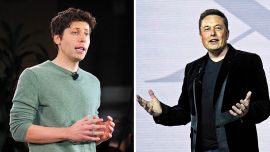Argentina’s Central Bank Governor Santiago Bausili and Finance Secretary Pablo Quirno are scheduled to meet with People’s Bank of China Governor Pan Gongsheng in Beijing as soon as Monday, amid negotiations over an US$18-billion swap line, according to a person with direct knowledge.
The top economic authorities, who departed Buenos Aires Friday, are travelling alongside Foreign Minister Diana Mondino in a bid to deepen ties with the key trade partner. Mondino, who left Thursday, will hold bilateral meetings with China’s Vice-President Han Zheng, International Trade Representative Wang Shouwen, and her counterpart, Wang Yi, according the person, who asked not to be named because the information isn’t public yet.
The meetings are subject to change depending on schedules. Argentina’s Central Bank and Economy Ministry declined to comment, when asked about the agenda in China.
The most pressing issue in the bilateral agenda is an US$18-billion currency swap between the monetary authorities of Argentina and China. Buenos Aires needs to renew by June roughly US$5 billion from that line after former economy minister Sergio Massa used the funds largely to finance imports in 2023. Last year, then-Central Bank governor Miguel Pesce met with his Chinese counterpart to negotiate another tranche of the swap that has never been used.
Largest-ever swap line
China’s swap is the largest source of foreign reserves in Argentina’s Central Bank, whose debts are currently larger than its assets. It’s become the biggest yuan swap line in the world, at a time when China has been using them in several countries to expand its global influence.
Mondino is joined by a large delegation of Argentine business people who will participate in various meetings to lure investments into Argentina and grow the trade partnership. She will also meet on Tuesday with high-level Chinese officials to promote investment in infrastructure in Argentina, according the person.
Among other issues, the officials will discuss the future of a hydroelectric power project in Santa Cruz, the biggest ongoing Chinese project in Argentina, which is on hold because of a lack of Argentine financing. President Javier Milei froze all public works since taking office as part of his austerity cuts.
On the campaign trail, Milei raised questions about the future of Argentina’s relations with the Asian giant if elected, calling the Chinese “assassins” and “communists.” He said he would leave it to the private sector to maintain commercial ties with China. In an April 4 interview with Bloomberg News, however, the president adopted a much more pragmatic tone, avoiding incendiary remarks and assuring he wouldn’t touch the currency swaps.
Chinese trade and investment drive large swathes of Argentina’s economy, ranging from commodities and energy to banking. That remains true even after the country reined in some of its foreign investment during a market rout. China is the second-biggest buyer of Argentina’s exports, behind only Brazil, and its main source of imports.
related news
by Manuela Tobias




















Comments